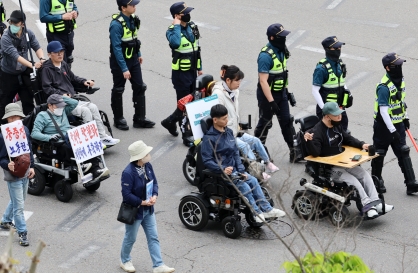A senior judge at Incheon District Court has rekindled the debate over the nature of social networking sites ― are they a private or public space?
The judge has caused a stir by posting a scathing message against President Lee Myung-bak and trade officials on his Facebook page after the ruling Grand National Party unilaterally passed a bill to ratify the Korea-U.S. Free Trade Agreement on Nov. 22.
His posting read: “I will never forget Nov. 22, 2011, the day when the president and trade officials, who are pro-American to the bone, sold out the nation’s economy.”
The judge is a member of a law research society established by progressive-minded judges. More than a dozen individuals, including other members of the study group, supported his view by clicking the “like” tab on his page.
On Nov. 13, the judge had posted a message that read: “If the investor-state dispute clause in the KORUS FTA encroaches upon the country’s judicial sovereignty, isn’t it right that judges express their views?”
The judge removed the Nov. 22 posting as it attracted media attention. But conservative papers criticized him for posting an “inflammatory” comment on a social networking site, which they asserted could not be seen as a private space.
In their view, a posting on SNS such as Facebook or Twitter is not like an email because anyone can read it. On these grounds, they alleged that the judge breached his obligation to remain politically neutral and hence called on the Supreme Court to punish him.
The media attack led the judge to defend himself. In an article on his Facebook page, he said writing a message on a Facebook page is “nothing more than having a chat with your friends in your home.”
He further asserted that in a democracy, a judge can express his personal views on controversial issues because he is also a citizen. In many European countries, he noted, judges do so.
Yet the Supreme Court said Friday it has referred the case to the public servants ethics committee to determine whether the judge breached the code of conduct. The court also said it would consider setting a guideline regarding the use of SNS by judges and court employees to prevent the occurrence of similar incidents.
SNS sites offer a personal space where people can talk about private things. Yet the space can also be made open to the public. The boundaries between private and public are blurred. Hence public office holders would do well to take care when posting their views on these sites.
The judge has caused a stir by posting a scathing message against President Lee Myung-bak and trade officials on his Facebook page after the ruling Grand National Party unilaterally passed a bill to ratify the Korea-U.S. Free Trade Agreement on Nov. 22.
His posting read: “I will never forget Nov. 22, 2011, the day when the president and trade officials, who are pro-American to the bone, sold out the nation’s economy.”
The judge is a member of a law research society established by progressive-minded judges. More than a dozen individuals, including other members of the study group, supported his view by clicking the “like” tab on his page.
On Nov. 13, the judge had posted a message that read: “If the investor-state dispute clause in the KORUS FTA encroaches upon the country’s judicial sovereignty, isn’t it right that judges express their views?”
The judge removed the Nov. 22 posting as it attracted media attention. But conservative papers criticized him for posting an “inflammatory” comment on a social networking site, which they asserted could not be seen as a private space.
In their view, a posting on SNS such as Facebook or Twitter is not like an email because anyone can read it. On these grounds, they alleged that the judge breached his obligation to remain politically neutral and hence called on the Supreme Court to punish him.
The media attack led the judge to defend himself. In an article on his Facebook page, he said writing a message on a Facebook page is “nothing more than having a chat with your friends in your home.”
He further asserted that in a democracy, a judge can express his personal views on controversial issues because he is also a citizen. In many European countries, he noted, judges do so.
Yet the Supreme Court said Friday it has referred the case to the public servants ethics committee to determine whether the judge breached the code of conduct. The court also said it would consider setting a guideline regarding the use of SNS by judges and court employees to prevent the occurrence of similar incidents.
SNS sites offer a personal space where people can talk about private things. Yet the space can also be made open to the public. The boundaries between private and public are blurred. Hence public office holders would do well to take care when posting their views on these sites.
-
Articles by Korea Herald



















